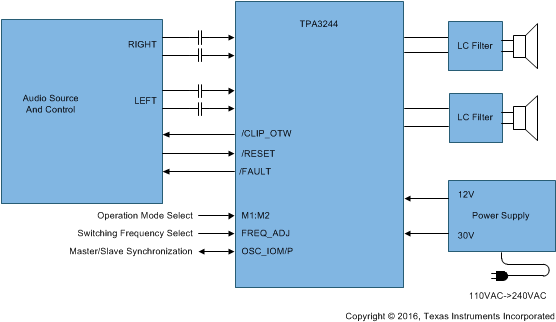SLASEC6A April 2016 – November 2016 TPA3244
PRODUCTION DATA.
- 1 Features
- 2 Applications
- 3 Description
- 4 Revision History
- 5 Device Comparison Table
- 6 Pin Configuration and Functions
- 7 Specifications
- 8 Parameter Measurement Information
-
9 Detailed Description
- 9.1 Overview
- 9.2 Functional Block Diagrams
- 9.3 Feature Description
- 9.4
Device Functional Modes
- 9.4.1
Device Protection System
- 9.4.1.1 Overload and Short Circuit Current Protection
- 9.4.1.2 Signal Clipping and Pulse Injector
- 9.4.1.3 DC Speaker Protection
- 9.4.1.4 Pin-to-Pin Short Circuit Protection (PPSC)
- 9.4.1.5 Overtemperature Protection OTW and OTE
- 9.4.1.6 Undervoltage Protection (UVP) and Power-on Reset (POR)
- 9.4.1.7 Fault Handling
- 9.4.1.8 Device Reset
- 9.4.1
Device Protection System
-
10Application and Implementation
- 10.1 Application Information
- 10.2 Typical Applications
- 10.3 Typical Application, Differential (2N), PBTL (Outputs Paralleled after LC filter)
- 11Power Supply Recommendations
-
12Layout
- 12.1 Layout Guidelines
- 12.2
Layout Examples
- 12.2.1 BTL Application Printed Circuit Board Layout Example
- 12.2.2 SE Application Printed Circuit Board Layout Example
- 12.2.3 PBTL (Outputs Paralleled before LC filter) Application Printed Circuit Board Layout Example
- 12.2.4 PBTL (Outputs Paralleled after LC filter) Application Printed Circuit Board Layout Example
- 13Device and Documentation Support
- 14Mechanical, Packaging, and Orderable Information
Package Options
Refer to the PDF data sheet for device specific package drawings
Mechanical Data (Package|Pins)
- DDW|44
Thermal pad, mechanical data (Package|Pins)
Orderable Information
1 Features
- Differential Analog Inputs
- Total Output Power at 10%THD+N
- 60-W Stereo Continuous into 8 Ω in BTL Configuration at 30 V
- 110-W Stereo Peak into 4 Ω in BTL Configuration at 30 V
- Total Output Power at 1%THD+N
- 50-W Stereo Continuous into 8 Ω in BTL Configuration at 30 V
- 90-W Stereo Peak into 4 Ω in BTL Configuration at 30 V
- Advanced Integrated Feedback Design with High-speed Gate Driver Error Correction
(PurePath™ Ultra-HD)- Signal Bandwidth up to 100 kHz for High Frequency Content From HD Sources
- Ultra Low 0.005% THD+N at 1 W into 4 Ω and <0.01% THD+N to Clipping
- 60 dB PSRR (BTL, No Input Signal)
- <55 µV (A-Weighted) Output Noise
- >110 dB (A Weighted) SNR
- Multiple Configurations Possible:
- Stereo, Mono, 2.1 and 4xSE
- Click and Pop Free Startup and Stop
- 94% Efficient Class-D Operation (8 Ω)
- Wide 12-V to 30-V Supply Voltage Operation
- Self-Protection Design (Including Undervoltage, Overtemperature, Clipping, and Short Circuit Protection) With Error Reporting
- EMI Compliant When Used With Recommended System Design
2 Applications
- High End Soundbar
- Mini Combo Systems
- Blu-Ray Disc™ / DVD Receivers
- Active Speakers
3 Description
The TPA3244 device is a high performance Class-D power amplifier that enables true premium sound quality with Class-D efficiency. It features an advanced integrated feedback design and proprietary high-speed gate driver error correction (PurePath™ Ultra-HD). This technology allows ultra low distortion across the audio band and superior audio quality. With a 30-V power supply the device can drive up to 2 x 110 W peak into 4-Ω load and 2 x 60 W continuous into 8-Ω load and features a 2-VRMS analog input interface that works seamlessly with high performance DACs such as Burr-Brown PCM52xx DAC Family from TI (that is, PCM5242 / PCM5252). In addition to excellent audio performance, TPA3244 achieves both high power efficiency and very low power stage idle losses below 0.45 W. This is achieved through the use of 65 mΩ MOSFETs and an optimized gate driver scheme that achieves significantly lower idle losses than typical discrete implementations.
Device Information(1)
| PART NUMBER | PACKAGE | BODY SIZE (NOM) |
|---|---|---|
| TPA3244 | HTSSOP (44) | 6.10mm x 14.00mm |
- For all available packages, see the orderable addendum at the end of the data sheet.
Simplified Schematic

Total Harmonic Distortion
